Trending Articles
- Intermittent fasting triggers interorgan communication to suppress hair follicle regeneration. Chen H, et al. Cell. 2024. PMID: 39674178
- Global, regional, and national progress towards the 2030 global nutrition targets and forecasts to 2050: a systematic analysis for the Global Burden of Disease Study 2021. Global Nutrition Target Collaborators. Lancet. 2024. PMID: 39667386
- Inhibiting intracellular CD28 in cancer cells enhances antitumor immunity and overcomes anti-PD-1 resistance via targeting PD-L1. Yang Z, et al. Cancer Cell. 2024. PMID: 39672166
- Progressive chromatin rewiring by ETO2::GLIS2 revealed in a human iPSC model of pediatric leukemia initiation. Boudia F, et al. Blood. 2024. PMID: 39656971
- π-HuB: the proteomic navigator of the human body. He F, et al. Nature. 2024. PMID: 39663494 Review.

Latest Literature
- Am J Med (1)
- Ann Oncol (1)
- Clin Pharmacokinet (1)
- J Am Acad Dermatol (3)
- J Appl Physiol (1985) (1)
- J Neurosci (1)
- Nat Commun (9)
- Nat Rev Cancer (2)
- Nature (10)
NCBI Literature Resources
MeSH PMC Bookshelf Disclaimer
The PubMed wordmark and PubMed logo are registered trademarks of the U.S. Department of Health and Human Services (HHS). Unauthorized use of these marks is strictly prohibited.

Explore millions of high-quality primary sources and images from around the world, including artworks, maps, photographs, and more.
Explore climate change issues through a variety of media types
- Part of Journal of Strategic Security, Vol. 13, No. 4, Climate Change and Global Security (2020)
- Part of Pew Research Center
- Part of The Climate Crisis and Other Animals, 2024, pp. 89-122 (34 pages)
- Part of Street Art Graphics on JSTOR
- Part of Stockholm International Peace Research Institute
- Part of The Journal of Economic Perspectives, Vol. 37, No. 3 (Summer 2023)
- Part of Subjunctive Aesthetics: Mexican Cultural Production in the Era of Climate Change, 2024
- Part of ODI
- Part of National Civic Review, Vol. 112, No. 1 (Spring 2023)
- Part of Refuge in a Moving World: Tracing refugee and migrant journeys across disciplines, 2020
- Part of Carnegie Endowment for International Peace
Harness the power of visual materials—explore more than 3 million images now on JSTOR.
Enhance your scholarly research with underground newspapers, magazines, and journals.
Explore collections in the arts, sciences, and literature from the world’s leading museums, archives, and scholars.

28 Best Academic Search Engines That make your research easier
This post may contain affiliate links that allow us to earn a commission at no expense to you. Learn more

If you’re a researcher or scholar, you know that conducting effective online research is a critical part of your job. And if you’re like most people, you’re always on the lookout for new and better ways to do it.
I’m sure you are familiar with some research databases. But, top researchers keep an open mind and are always looking for inspiration in unexpected places.
This article aims to give you an edge over researchers that rely mainly on Google for their entire research process.
Our list of 28 academic search engines will start with the more familiar to less.
Table of Contents
#1. Google Scholar

Google Scholar is an academic search engine that indexes the full text or metadata of scholarly literature across an array of publishing formats and disciplines.
Great for academic research, you can use Google Scholar to find articles from academic journals, conference proceedings, theses, and dissertations. The results returned by Google Scholar are typically more relevant and reliable than those from regular search engines like Google.
Tip: You can restrict your results to peer-reviewed articles only by clicking on the “Scholarly”
- Scholarly results are typically more relevant and reliable than those from regular search engines like Google.
- You can restrict your results to peer-reviewed articles only by clicking on the “Scholarly” tab.
- Google Scholar database Coverage is extensive, with approx. 200 million articles indexed.
- Abstracts are available for most articles.
- Related articles are shown, as well as the number of times an article has been cited.
- Links to full text are available for many articles.
- Abstracts are only a snippet of the full article, so you might need to do additional searching to get the full information you need.
- Not all articles are available in full text.
Google Scholar is completely free.
#2. ERIC (Education Resources Information Center)
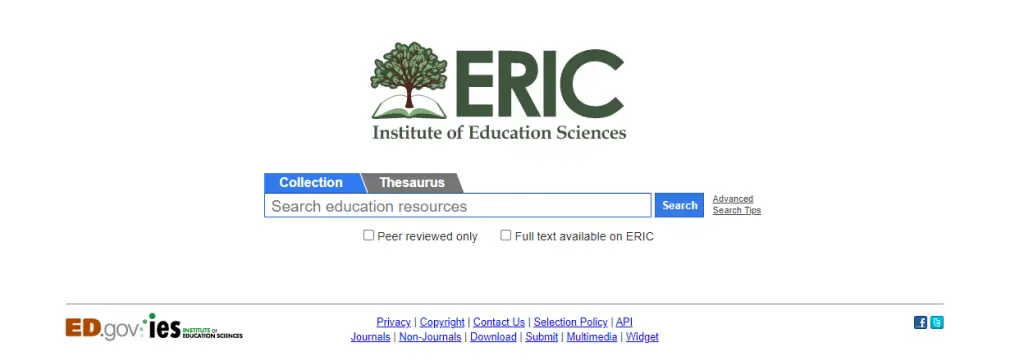
ERIC (short for educational resources information center) is a great academic search engine that focuses on education-related literature. It is sponsored by the U.S. Department of Education and produced by the Institute of Education Sciences.
ERIC indexes over a million articles, reports, conference papers, and other resources on all aspects of education from early childhood to higher education. So, search results are more relevant to Education on ERIC.
- Extensive coverage: ERIC indexes over a million articles, reports, and other resources on all aspects of education from early childhood to higher education.
- You can limit your results to peer-reviewed journals by clicking on the “Peer-Reviewed” tab.
- Great search engine for educators, as abstracts are available for most articles.
ERIC is a free online database of education-related literature.
You might also like:
- SCI Journal: Science Journal Impact Factor
- 15 Best Websites to Download Research Papers for Free
- 11 Best Academic Writing Tools For Researchers 2024
- 10 Best Reference Management Software for Research 2024
- Academic Tools
#3. Wolfram Alpha

Wolfram Alpha is a “computational knowledge engine” that can answer factual questions posed in natural language. It can be a useful search tool.
Type in a question like “What is the square root of 64?” or “What is the boiling point of water?” and Wolfram Alpha will give you an answer.
Wolfram Alpha can also be used to find academic articles. Just type in your keywords and Wolfram Alpha will generate a list of academic articles that match your query.
Tip: You can restrict your results to peer-reviewed journals by clicking on the “Scholarly” tab.
- Can answer factual questions posed in natural language.
- Can be used to find academic articles.
- Results are ranked by relevance.
- Results can be overwhelming, so it’s important to narrow down your search criteria as much as possible.
- The experience feels a bit more structured but it could also be a bit restrictive
Wolfram Alpha offers a few pricing options, including a “Pro” subscription that gives you access to additional features, such as the ability to create custom reports. You can also purchase individual articles or download them for offline use.
Pro costs $5.49 and Pro Premium costs $9.99
#4. iSEEK Education
- 15 Best Websites To Download Research Papers For Free
- 30+ Essential Software For Researchers
- 15 Best Academic Research Trend Prediction Platforms
- 15 Best Academic Networking And Collaboration Platforms
iSEEK is a search engine targeting students, teachers, administrators, and caregiver. It’s designed to be safe with editor-reviewed content.
iSEEK Education also includes a “Cited by” feature which shows you how often an article has been cited by other researchers.
- Editor-reviewed content.
- “Cited by” feature shows how often an article has been cited by other researchers.
- Limited to academic content.
- Doesn’t have the breadth of coverage that some of the other academic search engines have.
iSEEK Education is free to use.
#5. BASE (Bielefeld Academic Search Engine)
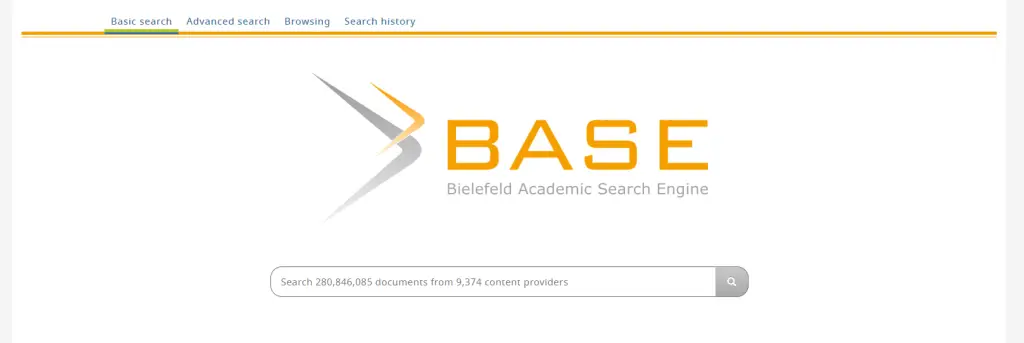
BASE is hosted at Bielefeld University in Germany and that’s where it name stems from (Bielefeld Academic Search Engine).
Known as “one of the most comprehensive academic web search engines,” it contains over 100 million documents from 4,000 different sources.
Users can narrow their search using the advanced search option, so regardless of whether you need a book, a review, a lecture, a video or a thesis, BASE has what you need.
BASE indexes academic articles from a variety of disciplines, including the arts, humanities, social sciences, and natural sciences.
- One of the world’s most voluminous search engines,
- Indexes academic articles from a variety of disciplines, especially for academic web resources
- Includes an “Advanced Search” feature that lets you restrict your results to peer-reviewed journals.
- Doesn’t include abstracts for most articles.
- Doesn’t have related articles, references, cited by
BASE is free to use.
- 10 Best Reference Management Software for Research 2023
- 15 Best Academic Networking and Collaboration Platforms
- 30+ Essential Software for Researchers
- 15 Best Academic Blogging and Content Management
- 11 Best Academic Writing Tools For Researchers
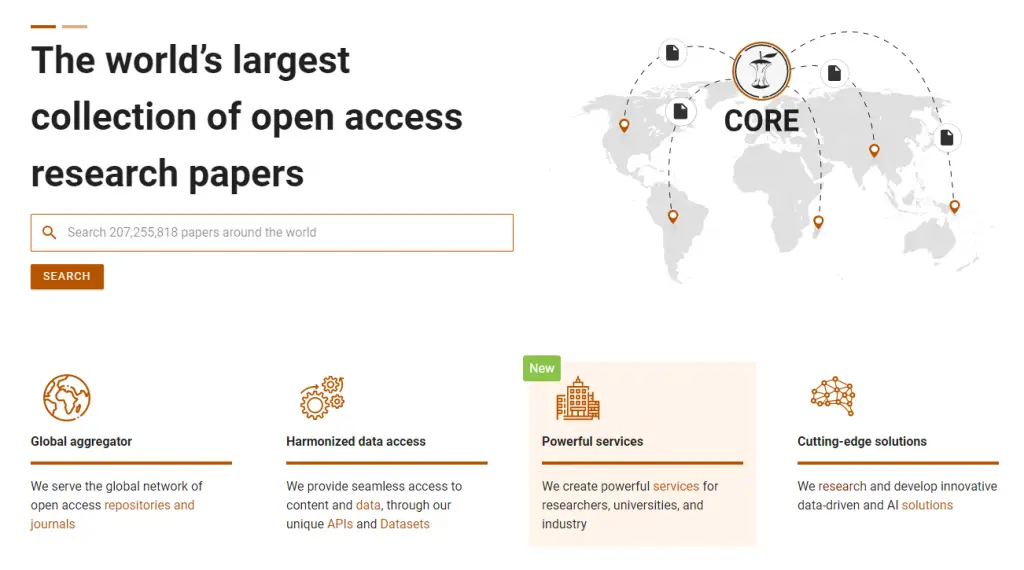
CORE is an academic search engine that focuses on open access research papers. A link to the full text PDF or complete text web page is supplied for each search result. It’s academic search engine dedicated to open access research papers.
- Focused on open access research papers.
- Links to full text PDF or complete text web page are supplied for each search result.
- Export formats include BibTeX, Endnote, RefWorks, Zotero.
- Coverage is limited to open access research papers.
- No abstracts are available for most articles.
- No related articles, references, or cited by features.
CORE is free to use.
- Best Plagiarism Checkers for Research Papers in 2024
#7. Science.gov

Science.gov is a search engine developed and managed by the United States government. It includes results from a variety of scientific databases, including NASA, EPA, USGS, and NIST.
US students are more likely to have early exposure to this tool for scholarly research.
- Coverage from a variety of scientific databases (200 million articles and reports).
- Links to full text are available for some articles.
Science.gov is free to use.
- 15 Best Academic Journal Discovery Platforms
- Sci Hub Review
#8. Semantic Scholar

Semantic Scholar is a recent entrant to the field. Its goal is to provide more relevant and effective search results via artificial intelligence-powered methods that detect hidden relationships and connections between research topics.
- Powered by artificial intelligence, which enhances search results.
- Covers a large number of academic articles (approx. 40 million).
- Related articles, references, and cited by features are all included.
- Links to full text are available for most articles.
Semantic Scholar is free to use.
- 11 Best Academic Writing Tools For Researchers
- 10 Best Reference Management Software for Research
- 15 Best Academic Journal Discovery Platforms
#9. RefSeek

RefSeek searches more than five billion documents, including web pages, books, encyclopedias, journals, and newspapers.
This is one of the free search engines that feels like Yahoo with a massive directory. It could be good when you are just looking for research ideas from unexpected angles. It could lead you to some other database that you might not know such as the CIA The World Factbook, which is a great reference tool.
- Searches more than five billion documents.
- The Documents tab is very focused on research papers and easy to use.
- Results can be filtered by date, type of document, and language.
- Good source for free academic articles, open access journals, and technical reports.
- The navigation and user experience is very dated even to millenials…
- It requires more than 3 clicks to dig up interesting references (which is how it could lead to you something beyond the 1st page of Google)
- The top part of the results are ALL ads (well… it’s free to use)
RefSeek is free to use.
#10. ResearchGate
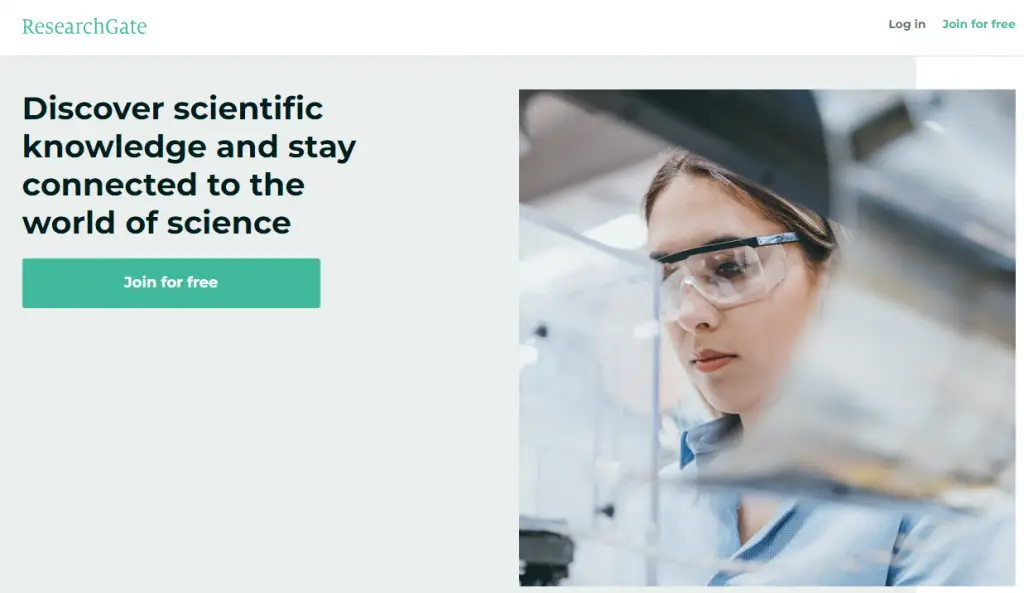
A mixture of social networking site + forum + content databases where researchers can build their profile, share research papers, and interact with one another.
Although it is not an academic search engine that goes outside of its site, ResearchGate ‘s library of works offers an excellent choice for any curious scholar.
There are more than 100 million publications available on the site from over 11 million researchers. It is possible to search by publication, data, and author, as well as to ask the researchers questions.
- A great place to find research papers and researchers.
- Can follow other researchers and get updates when they share new papers or make changes to their profile.
- The network effect can be helpful in finding people who have expertise in a particular topic.
- Interface is not as user friendly
- Can be overwhelming when trying to find relevant papers.
- Some papers are behind a paywall.
ResearchGate is free to use.
- 15 Best Academic Research Trend Prediction Platforms
- 25 Best Tools for Tracking Research Impact and Citations
#11. DataONE Search (formerly CiteULike)
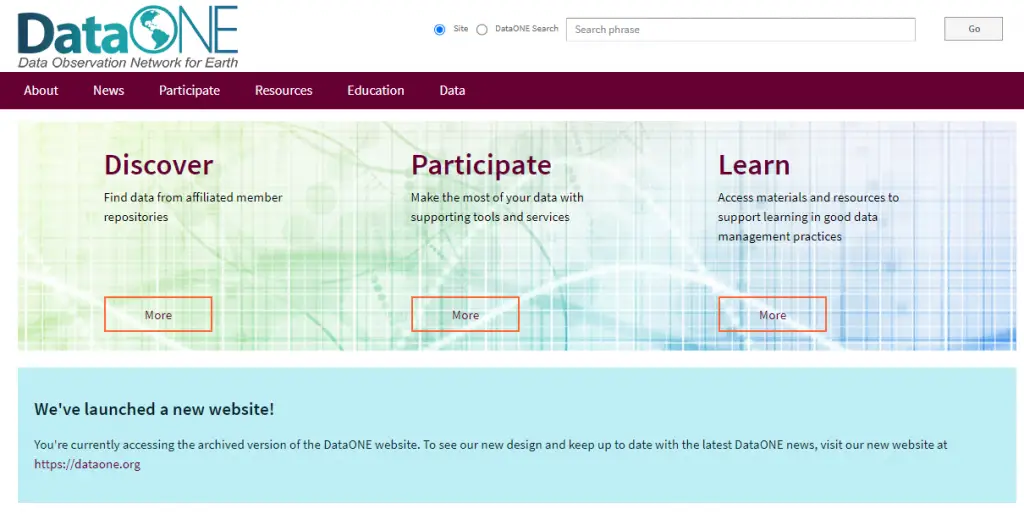
A social networking site for academics who want to share and discover academic articles and papers.
- A great place to find academic papers that have been shared by other academics.
- Some papers are behind a paywall
CiteULike is free to use.
#12. DataElixir

DataElixir is deigned to help you find, understand and use data. It includes a curated list of the best open datasets, tools and resources for data science.
- Dedicated resource for finding open data sets, tools, and resources for data science.
- The website is easy to navigate.
- The content is updated regularly
- The resources are grouped by category.
- Not all of the resources are applicable to academic research.
- Some of the content is outdated.
DataElixir is free to use.
#13. LazyScholar – browser extension
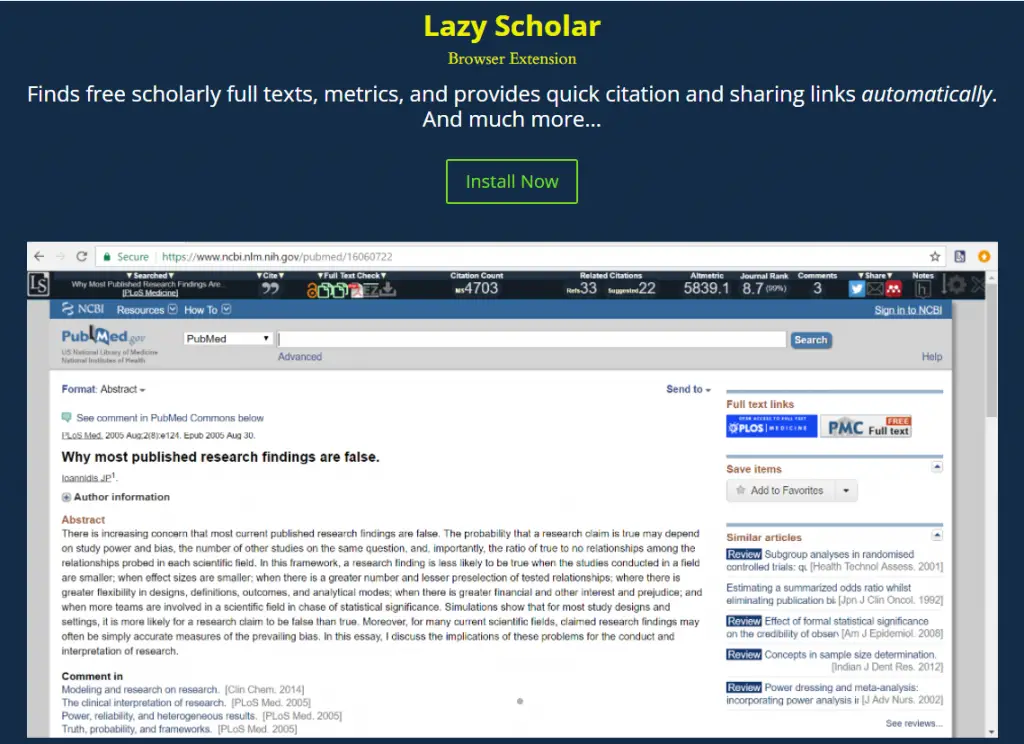
LazyScholar is a free browser plugin that helps you discover free academic full texts, metrics, and instant citation and sharing links. Lazy Scholar is created Colby Vorland, a postdoctoral fellow at Indiana University.
- It can integrate with your library to find full texts even when you’re off-campus.
- Saves your history and provides an interface to find it.
- A pre-formed citation is availlable in over 900 citation styles.
- Can recommend you topics and scans new PubMed listings to suggest new papers
- Results can be a bit hit or miss
LazyScholar is free to use.
#14. CiteseerX – digital library from PenState

CiteseerX is a digital library stores and indexes research articles in Computer Science and related fields. The site has a robust search engine that allows you to filter results by date, author.
- Searches a large number of academic papers.
- Results can be filtered by date, author, and topic.
- The website is easy to use.
- You can create an account and save your searches for future reference.
CiteseerX is free to use.
- Surfer Review: Is It Worth It?
- 25 Best Tools For Tracking Research Impact And Citations
#15. The Lens – patents search
The Lens or the Patent Lens is an online patent and scholarly literature search facility, provided by Cambia, an Australia-based non-profit organization.

- Searches for a large number of academic papers.
The price range can be free for non-profit use to $5,000 for commercial enterprise.
#16. Fatcat – wiki for bibliographic catalog
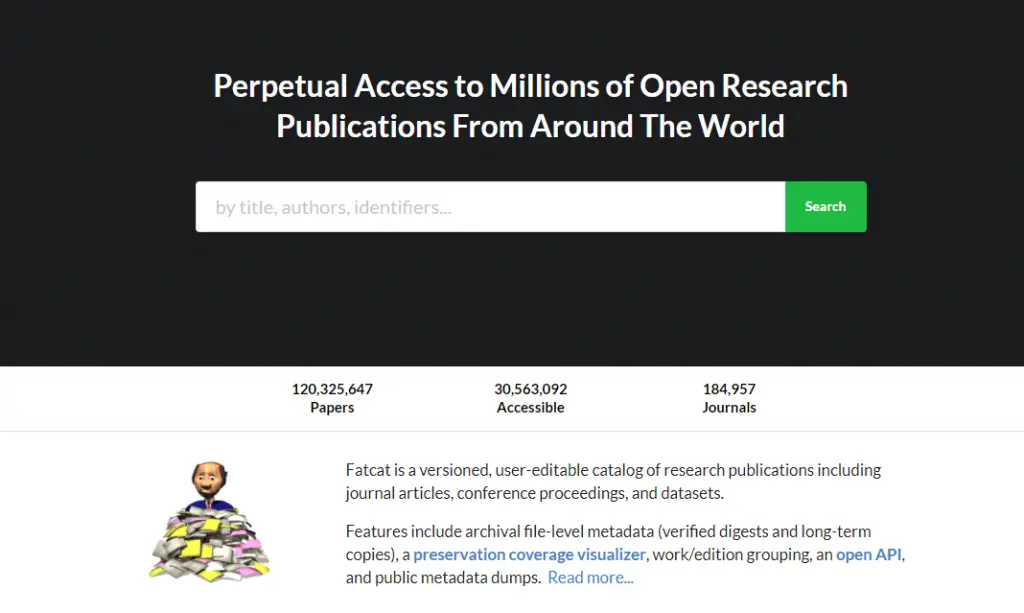
Fatcat is an open bibliographic catalog of written works. The scope of works is somewhat flexible, with a focus on published research outputs like journal articles, pre-prints, and conference proceedings. Records are collaboratively editable, versioned, available in bulk form, and include URL-agnostic file-level metadata.
- Open source and collaborative
- You can be part of the community that is very focused on its mission
- The archival file-level metadata (verified digests and long-term copies) is a great feature.
- Could prove to be another rabbit hole
- People either love or hate the text-only interface
#17. Lexis Web – Legal database
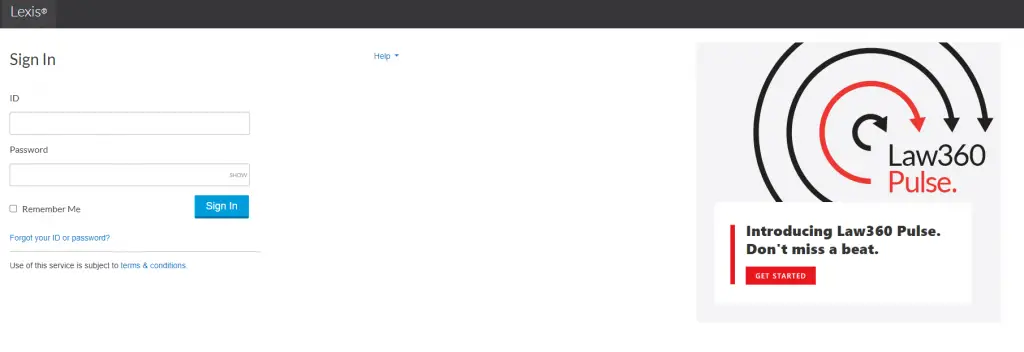
Are you researching legal topics? You can turn to Lexis Web for any law-related questions you may have. The results are drawn from legal sites and can be filtered based on criteria such as news, blogs, government, and commercial. Additionally, users can filter results by jurisdiction, practice area, source and file format.
- Results are drawn from legal sites.
- Filters are available based on criteria such as news, blogs, government, and commercial.
- Users can filter results by jurisdiction, practice area, source and file format.
- Not all law-related questions will be answered by this search engine.
- Coverage is limited to legal sites only.
Lexis Web is free for up to three searches per day. After that, a subscription is required.
#18. Infotopia – part of the VLRC family
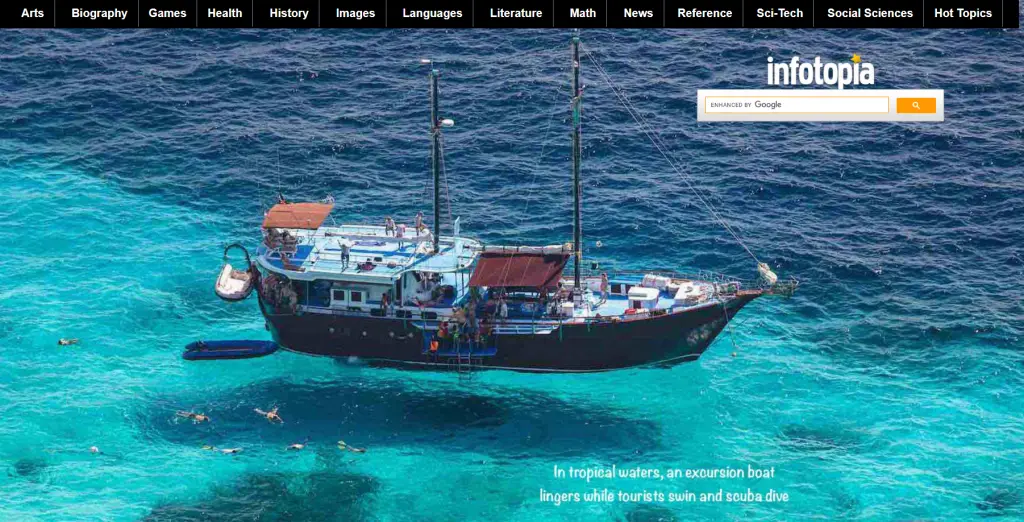
Infotopia touts itself as an “alternative to Google safe search.” Scholarly book results are curated by librarians, teachers, and other educational workers. Users can select from a range of topics such as art, health, and science and technology, and then see a list of resources pertaining to the topic.
Consequently, if you aren’t able to find what you are looking for within Infotopia’s pages, you will probably find it on one of its many suggested websites.
#19. Virtual Learning Resources Center
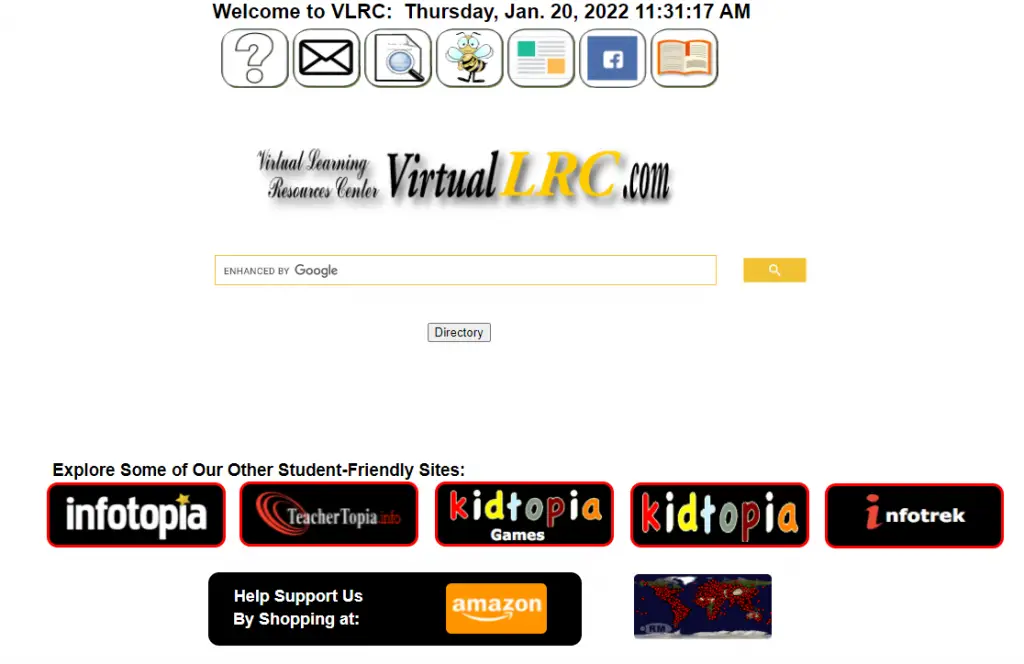
Virtual Learning Resources Center (VLRC) is an academic search engine that features thousands of academic sites chosen by educators and librarians worldwide. Using an index generated from a research portal, university, and library internet subject guides, students and instructors can find current, authoritative information for school.
- Thousands of academic information websites indexed by it. You will also be able to get more refined results with custom Google search, which will speed up your research.
- Many people consider VLRC as one of the best free search engines to start looking for research material.
- TeachThought rated the Virtual LRC #3 in it’s list of 100 Search Engines For Academic Research
- More relevant to education
- More relevant to students

Powered by Google Custom Search Engine (CSE), Jurn is a free online search engine for accessing and downloading free full-text scholarly papers. It was created by David Haden in a public open beta version in February 2009, initially for locating open access electronic journal articles in the arts and humanities.
After the indexing process was completed, a website containing additional public directories of web links to indexed publications was introduced in mid-2009. The Jurn search service and directory has been regularly modified and cleaned since then.
- A great resource for finding academic papers that are behind paywalls.
- The content is updated regularly.uren
Jurn is free to use.
#21. WorldWideScience
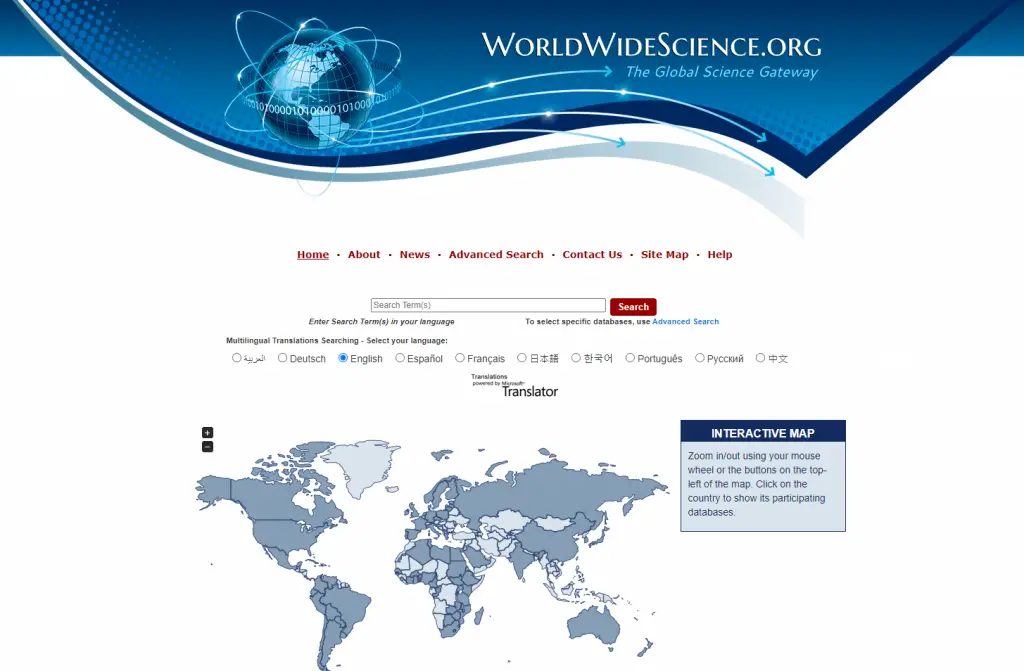
The Office of Scientific and Technical Information—a branch of the Office of Science within the U.S. Department of Energy—hosts the portal WorldWideScience , which has dubbed itself “The Global Science Gateway.”
Over 70 countries’ databases are used on the website. When a user enters a query, it contacts databases from all across the world and shows results in both English and translated journals and academic resources.
- Results can be filtered by language and type of resource
- Interface is easy to use
- Contains both academic journal articles and translated academic resources
- The website can be difficult to navigate.
WorldWideScience is free to use.
#22. Google Books
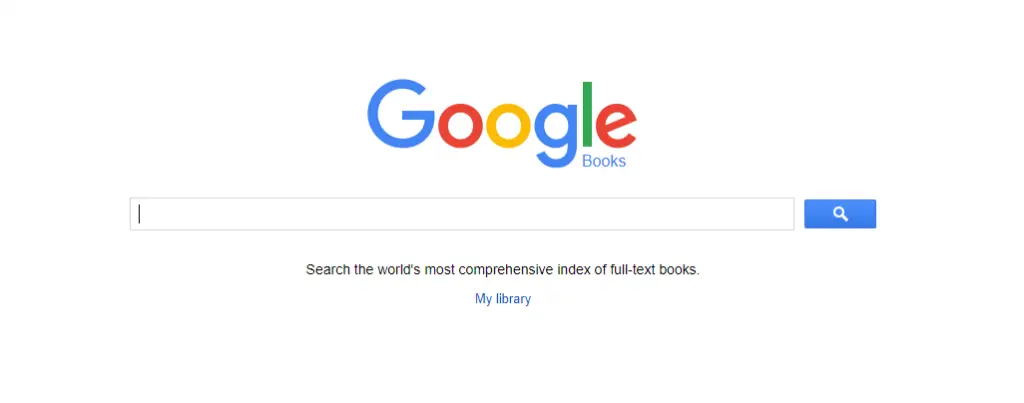
A user can browse thousands of books on Google Books, from popular titles to old titles, to find pages that include their search terms. You can look through pages, read online reviews, and find out where to buy a hard copy once you find the book you are interested in.
#23. DOAJ (Directory of Open Access Journals)
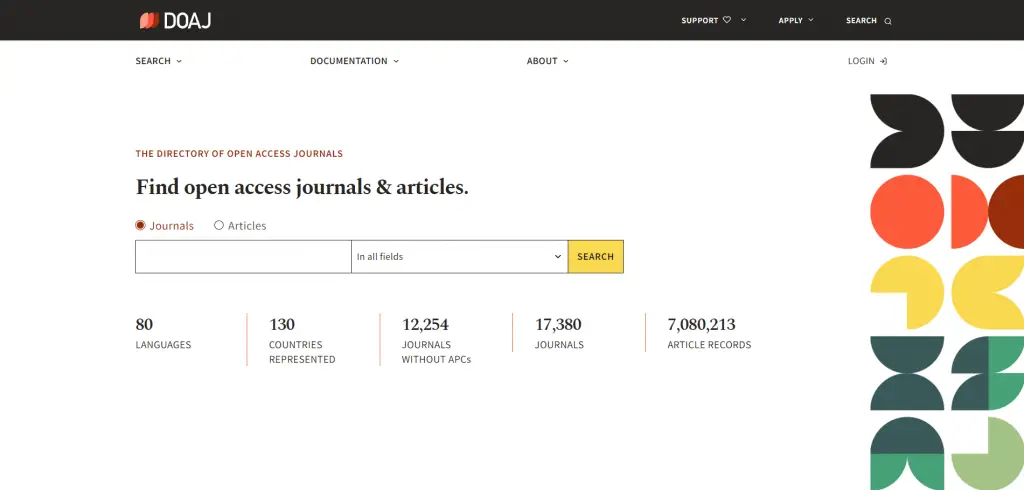
DOAJ is a free search engine for scientific and scholarly materials. It is a searchable database with over 8,000 peer-reviewed research papers organized by subject. It’s one of the most comprehensive libraries of scientific and scholarly resources, with over 8,000 journals available on a variety of themes.
#24. Baidu Scholar

Baidu Xueshu (Academic) is the Chinese version for Google Scholar. IDU Scholar indexes academic papers from a variety of disciplines in both Chinese and English.
- Articles are available in full text PDF.
- Covers a variety of academic disciplines.
- No abstracts are available for most articles, but summaries are provided for some.
- A great portal that takes you to different specialized research platform
- You need to be able to read Chinese to use the site
- Since 2021 there is a rise of focus on China and the Chinese Communist Party
Baidu Scholar is free to use.
#25. PubMed Central
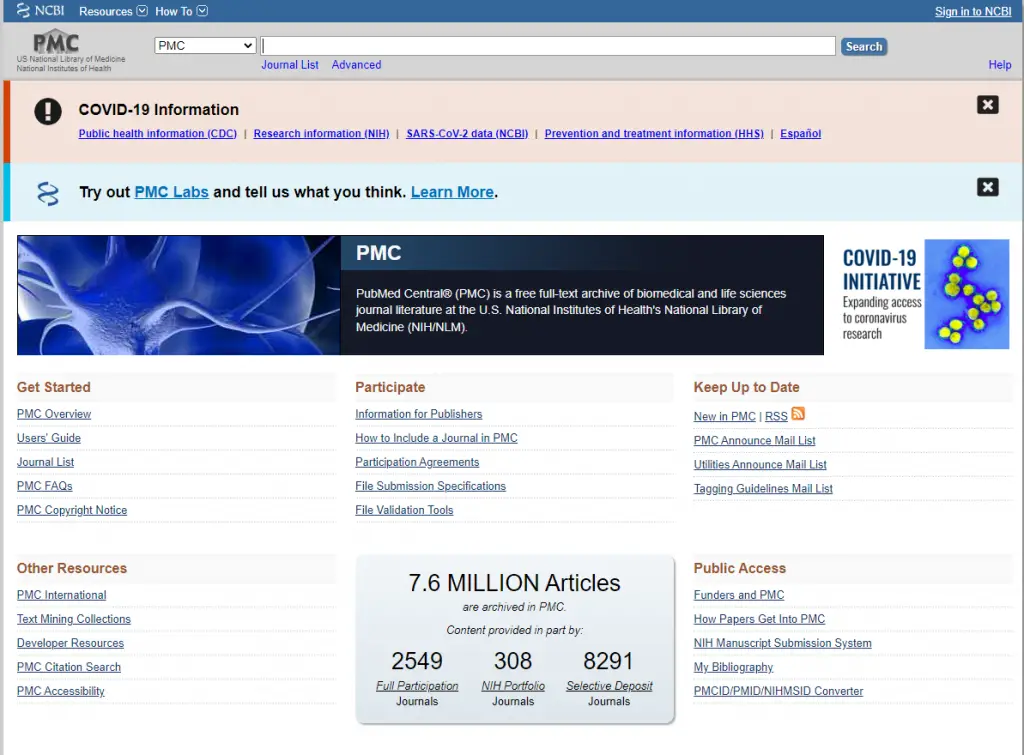
PubMed is a free search engine that provides references and abstracts for medical, life sciences, and biomedical topics.
If you’re studying anything related to healthcare or science, this site is perfect. PublicMed Central is operated by the National Center for Biotechnology Information, a division of the U.S. National Library of Medicine. It contains more than 3 million full-text journal articles.
It’s similar to PubMed Health, which focuses on health-related research and includes abstracts and citations to over 26 million articles.
#26. MEDLINE®
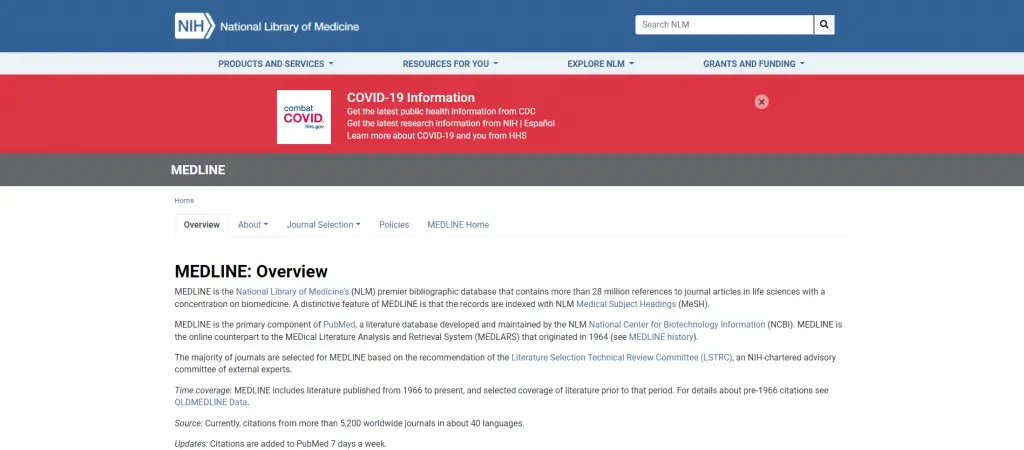
MEDLINE® is a paid subscription database for life sciences and biomedicine that includes more than 28 million citations to journal articles. For finding reliable, carefully chosen health information, Medline Plus provides a powerful search tool and even a dictionary.
- A great database for life sciences and biomedicine.
- Contains more than 28 million references to journal articles.
- References can be filtered by date, type of document, and language.
- The database is expensive to access.
- Some people find it difficult to navigate and find what they are looking for.
MEDLINE is not free to use ( pricing information ).
Defunct Academic Search Engines
#27. microsoft academic .
Microsoft Academic
Microsoft Academic Search seemed to be a failure from the beginning. It ended in 2012, then re-launched in 2016 as Microsoft Academic. It provides the researcher with the opportunity to search academic publications,
Microsoft Academic used to be the second-largest academic search engine after Google Scholar. Microsoft Academic provides a wealth of data for free, but Microsoft has announced that it will shut Microsoft Academic down in by 2022.
#28. Scizzle
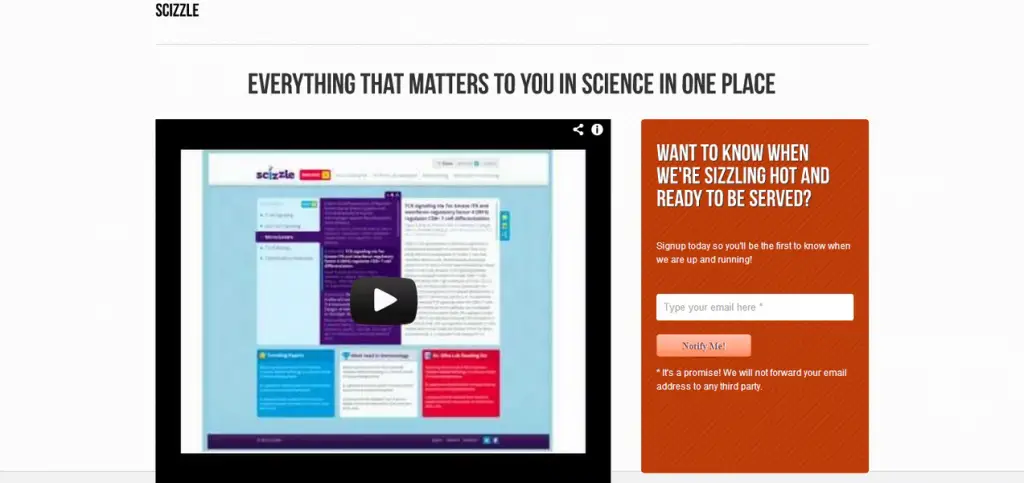
Designed to help researchers stay on top of the literature by setting up email alerts, based on key terms, for newspapers.
Unfortunately, academic search engines come and go. These are two that are no longer available.

Final Thoughts
There are many academic search engines that can help researchers and scholars find the information they need. This list provides a variety of options, starting with more familiar engines and moving on to less well-known ones.
Keeping an open mind and exploring different sources is essential for conducting effective online research. With so much information at our fingertips, it’s important to make sure we’re using the best tools available to us.
Tell us in the comment below which academic search engine have you not heard of? Which database do you think we should add? What database do your professional societies use? What are the most useful academic websites for research in your opinion?
There is more.
Check out our other articles on the Best Academic Tools Series for Research below.
- Learn how to get more done with these Academic Writing Tools
- Learn how to proofread your work with these Proofreading Tools
- Learn how to broaden your research landscape with these Academic Search Engines
- Learn how to manage multiple research projects with these Project Management Tools
- Learn how to run effective survey research with these Survey Tools for Research
- Learn how get more insights from important conversations and interviews with Transcription Tools
- Learn how to manage the ever-growing list of references with these Reference Management Software
- Learn how to double your productivity with literature reviews with these AI-Based Summary Generators
- Learn how to build and develop your audience with these Academic Social Network Sites
- Learn how to make sure your content is original and trustworthy with these Plagiarism Checkers
- Learn how to talk about your work effectively with these Science Communication Tools
10 thoughts on “28 Best Academic Search Engines That make your research easier”
Thank you so much Joannah..I have found this information useful to me as librarian in an academic library
You are welcome! We are happy to hear that!
Thank You Team, for providing a comprehensive list of academic search engines that can help make research easier for students and scholars. The variety of search engines included offers a range of options for finding scholarly articles, journals, and other academic resources. The article also provides a brief summary of each search engine’s features, which helps in determining which one is the best fit for a specific research topic. Overall, this article is a valuable resource for anyone looking for a quick and easy way to access a wealth of academic information.
Thank you for taking the time to share your feedback with us. We are delighted to hear that you found our list of academic search engines helpful in making research easier for students and scholars. We understand the importance of having a variety of options when it comes to finding scholarly articles, journals, and other academic resources, and we strive to provide a comprehensive list of resources to meet those needs.
We are glad that you found the brief summary of each search engine’s features helpful in determining which one is the best fit for a specific research topic. Our goal is to make it easy for our readers to access valuable academic information and we’re glad that we were able to achieve that for you.
We appreciate your support and thank you for your kind words. We will continue to provide valuable resources for students and researchers in the future. Please let us know if you have any further questions or suggestions.
No more questions Thank You
I cannot thank you enough!!! thanks alot 🙂
Typography animation is a technique that combines text and motion to create visually engaging and dynamic animations. It involves animating individual letters, words, or phrases in various ways to convey a message, evoke emotions, or enhance the visual impact of a design or video. – Typography Animation Techniques Tools and Online Software {43}
Hi Joannah! Here’s another one you may want to add! Expontum ( https://www.expontum.com/ ) – Helps researchers quickly find knowledge gaps and identify what research projects have been completed before. Thanks!
Expontum – Helps researchers quickly find knowledge gaps and identify what research projects have been completed before. Expontum is free, open access, and available to all globally with no paid versions of the site. Automated processes scan research article information 24/7 so this website is constantly updating. By looking at over 35 million research publications (240 million by the end of 2023), the site has 146 million tagged research subjects and 122 million tagged research attributes. Learn more about methodology and sources on the Expontum About Page ( https://www.expontum.com/about.php )
Hey Ryan, I clicked and checked your site and thought it was very relevant to our reader. Thank you for sharing. And, we will be reviewing your site soon.
Sounds good! Thanks, Joannah!
Leave a Comment Cancel reply
Save my name, email, and website in this browser for the next time I comment.
We maintain and update science journals and scientific metrics. Scientific metrics data are aggregated from publicly available sources. Please note that we do NOT publish research papers on this platform. We do NOT accept any manuscript.
2012-2024 © scijournal.org
A free, AI-powered research tool for scientific literature
- Christopher Zeeman
- Skin Cancer
- Renaissance
New & Improved API for Developers
Introducing semantic reader in beta.
Stay Connected With Semantic Scholar Sign Up What Is Semantic Scholar? Semantic Scholar is a free, AI-powered research tool for scientific literature, based at Ai2.
Academia.edu no longer supports Internet Explorer.
To browse Academia.edu and the wider internet faster and more securely, please take a few seconds to upgrade your browser .
- We're Hiring!
- Help Center
Download 55 million PDFs for free
Explore our top research interests.

Engineering

Anthropology

- Earth Sciences

- Computer Science

- Mathematics

- Health Sciences

Join 278 million academics and researchers
Track your impact.
Share your work with other academics, grow your audience and track your impact on your field with our robust analytics
Discover new research
Get access to millions of research papers and stay informed with the important topics around the world
Publish your work
Publish your research with fast and rigorous service through Academia.edu Journals. Get instant worldwide dissemination of your work
Unlock the most powerful tools with Academia Premium

Work faster and smarter with advanced research discovery tools
Search the full text and citations of our millions of papers. Download groups of related papers to jumpstart your research. Save time with search alerts.
- Advanced Search
- PDF Packages of 37 papers
- Search Alerts

Share your work, track your impact, and grow your audience
Get notified when other academics mention you or cite your papers. Track your impact with in-depth analytics and network with members of your field.
- Mentions and Citations Tracking
- Advanced Analytics
- Publishing Tools
Real stories from real people

Used by academics at over 15,000 universities

Get started and find the best quality research
- Academia.edu Journals
- We're Hiring!
- Help Center
- Find new research papers in:
- Cognitive Science
- Academia ©2024
An official website of the United States government
Official websites use .gov A .gov website belongs to an official government organization in the United States.
Secure .gov websites use HTTPS A lock ( Lock Locked padlock icon ) or https:// means you've safely connected to the .gov website. Share sensitive information only on official, secure websites.
- Publications
- Account settings
PubMed Central (PMC) Home Page
- Journal List
PubMed Central ® (PMC) is a free full-text archive of biomedical and life sciences journal literature at the U.S. National Institutes of Health's National Library of Medicine (NIH/NLM)
Discover a digital archive of scholarly articles, spanning centuries of scientific research.
Learn how to find and read articles of interest to you.
Collections
Browse the PMC Journal List or learn about some of PMC's unique collections.
For Authors
Navigate the PMC submission methods to comply with a funder mandate, expand access, and ensure preservation.
For Publishers
Learn about deposit options for journals and publishers and the PMC selection process.
For Developers
Find tools for bulk download, text mining, and other machine analysis.
10.5 million articles are archived in PMC.
Full participation journals.
Journals deposit the complete contents of each issue or volume.
NIH Portfolio Journals
Journals deposit all NIH-funded articles as defined by the NIH Public Access Policy.
Selective Deposit Programs
Publisher deposits a subset of articles from a collection of journals.
PMC Transitions to Updated Website
On October 16, 2024, NLM's NCBI transitioned to an updated PubMed Central (PMC) website, representing the next step in ongo…
PMC Tagging Guidelines Accessibility Updates
The PMC Tagging Guidelines (TG) were updated on October 7, 2024, to provide new guidance for PMC data providers on how to de…
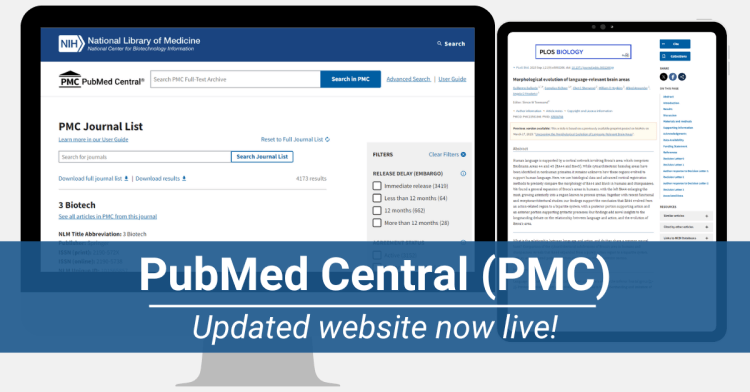
On October 16, 2024, NLM's NCBI transitioned to an updated PubMed Central (PMC) website, representing the next step in ongoing efforts to modernize NLM's products and services.
Reference management. Clean and simple.
The top list of academic search engines

1. Google Scholar
4. science.gov, 5. semantic scholar, 6. baidu scholar, get the most out of academic search engines, frequently asked questions about academic search engines, related articles.
Academic search engines have become the number one resource to turn to in order to find research papers and other scholarly sources. While classic academic databases like Web of Science and Scopus are locked behind paywalls, Google Scholar and others can be accessed free of charge. In order to help you get your research done fast, we have compiled the top list of free academic search engines.
Google Scholar is the clear number one when it comes to academic search engines. It's the power of Google searches applied to research papers and patents. It not only lets you find research papers for all academic disciplines for free but also often provides links to full-text PDF files.
- Coverage: approx. 200 million articles
- Abstracts: only a snippet of the abstract is available
- Related articles: ✔
- References: ✔
- Cited by: ✔
- Links to full text: ✔
- Export formats: APA, MLA, Chicago, Harvard, Vancouver, RIS, BibTeX

BASE is hosted at Bielefeld University in Germany. That is also where its name stems from (Bielefeld Academic Search Engine).
- Coverage: approx. 136 million articles (contains duplicates)
- Abstracts: ✔
- Related articles: ✘
- References: ✘
- Cited by: ✘
- Export formats: RIS, BibTeX

CORE is an academic search engine dedicated to open-access research papers. For each search result, a link to the full-text PDF or full-text web page is provided.
- Coverage: approx. 136 million articles
- Links to full text: ✔ (all articles in CORE are open access)
- Export formats: BibTeX

Science.gov is a fantastic resource as it bundles and offers free access to search results from more than 15 U.S. federal agencies. There is no need anymore to query all those resources separately!
- Coverage: approx. 200 million articles and reports
- Links to full text: ✔ (available for some databases)
- Export formats: APA, MLA, RIS, BibTeX (available for some databases)

Semantic Scholar is the new kid on the block. Its mission is to provide more relevant and impactful search results using AI-powered algorithms that find hidden connections and links between research topics.
- Coverage: approx. 40 million articles
- Export formats: APA, MLA, Chicago, BibTeX

Although Baidu Scholar's interface is in Chinese, its index contains research papers in English as well as Chinese.
- Coverage: no detailed statistics available, approx. 100 million articles
- Abstracts: only snippets of the abstract are available
- Export formats: APA, MLA, RIS, BibTeX

RefSeek searches more than one billion documents from academic and organizational websites. Its clean interface makes it especially easy to use for students and new researchers.
- Coverage: no detailed statistics available, approx. 1 billion documents
- Abstracts: only snippets of the article are available
- Export formats: not available

Consider using a reference manager like Paperpile to save, organize, and cite your references. Paperpile integrates with Google Scholar and many popular databases, so you can save references and PDFs directly to your library using the Paperpile buttons:

Google Scholar is an academic search engine, and it is the clear number one when it comes to academic search engines. It's the power of Google searches applied to research papers and patents. It not only let's you find research papers for all academic disciplines for free, but also often provides links to full text PDF file.
Semantic Scholar is a free, AI-powered research tool for scientific literature developed at the Allen Institute for AI. Sematic Scholar was publicly released in 2015 and uses advances in natural language processing to provide summaries for scholarly papers.
BASE , as its name suggest is an academic search engine. It is hosted at Bielefeld University in Germany and that's where it name stems from (Bielefeld Academic Search Engine).
CORE is an academic search engine dedicated to open access research papers. For each search result a link to the full text PDF or full text web page is provided.
Science.gov is a fantastic resource as it bundles and offers free access to search results from more than 15 U.S. federal agencies. There is no need any more to query all those resources separately!
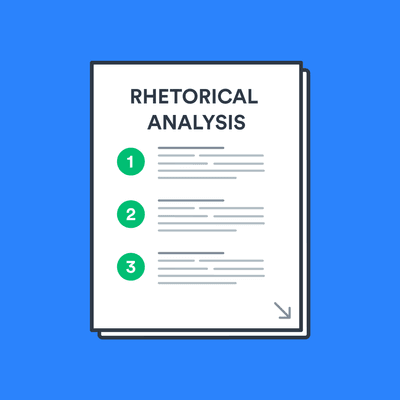

IMAGES
VIDEO
COMMENTS
Google Scholar provides a simple way to broadly search for scholarly literature. Search across a wide variety of disciplines and sources: articles, theses, books, abstracts and court opinions.
Find the research you need | With 160+ million publication pages, 1+ million questions, and 25+ million researchers, this is where everyone can access science Discover the world's scientific knowledge
PubMed® comprises more than 37 million citations for biomedical literature from MEDLINE, life science journals, and online books. Citations may include links to full text content from PubMed Central and publisher web sites.
Broaden your research with images and primary sources Broaden your research with images and primary sources. Harness the power of visual materials—explore more than 3 million images now on JSTOR. Search for images Enhance your scholarly research with underground newspapers, magazines, and journals. ... Search Artstor collections ...
The article also provides a brief summary of each search engine's features, which helps in determining which one is the best fit for a specific research topic. Overall, this article is a valuable resource for anyone looking for a quick and easy way to access a wealth of academic information. Reply
Semantic Scholar uses groundbreaking AI and engineering to understand the semantics of scientific literature to help Scholars discover relevant research.
Work faster and smarter with advanced research discovery tools. Search the full text and citations of our millions of papers. Download groups of related papers to jumpstart your research. ... "The bulk downloads give me the chance to read more related articles as well as seeing what research is citing the article I am looking at. It also ...
Search PMC Full-Text Archive Search in PMC. Advanced ... Discover a digital archive of scholarly articles, spanning centuries of scientific research. User Guide Learn how to find and read articles of interest to you. ... Journals deposit all NIH-funded articles as defined by the NIH Public Access Policy. 43
Google Scholar is the clear number one when it comes to academic search engines. It's the power of Google searches applied to research papers and patents. It not only lets you find research papers for all academic disciplines for free but also often provides links to full-text PDF files. Coverage: approx. 200 million articles
Access 160+ million publications and connect with 25+ million researchers. Join for free and gain visibility by uploading your research.